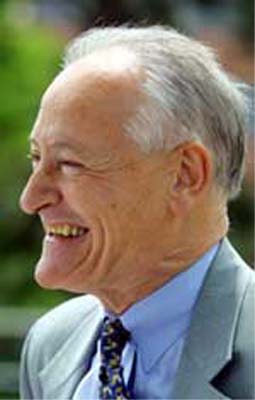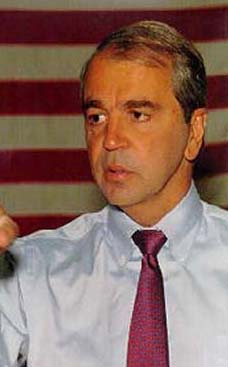
"You got to look out. Your enemies will hurt you less than your friends will," Mr. Rhodes said. More than 30 years later, Mr. Celeste, now the silver-haired president of Colorado College in Colorado Springs, Colo., still recalls the shrewd advice from Mr. Rhodes, a Republican who served four terms as Ohio's governor. Richard Celeste served as the 9th director of the Peace Corps after his appointment by President Carter. He has also served as Governor of Ohio, Ambassador to India, and President of Colorado College since 2002.
After being elected lieutenant governor in 1974, Richard Celeste received a warning from then-Gov. James Rhodes
Turbulent times in Columbus
By JOSHUA BOAK
BLADE STAFF WRITER
COLUMBUS - After being elected lieutenant governor in 1974, Richard Celeste received a warning from then-Gov. James Rhodes.
"You got to look out. Your enemies will hurt you less than your friends will," Mr. Rhodes said.
More than 30 years later, Mr. Celeste, now the silver-haired president of Colorado College in Colorado Springs, Colo., still recalls the shrewd advice from Mr. Rhodes, a Republican who served four terms as Ohio's governor.
In politics, dogged loyalty can be the same as betrayal. The friends whose money, connections, and intelligence can propel a candidate into the governor's mansion are just as capable of breaking the laws that the governor promises to uphold.
"When someone helps you to get into the position you wanted, you tend not to believe the worst about them," said Robert Adams, a political science professor at Wright State University. "Ultimately, Dick Celeste didn't abide by Rhodes' advice."
As Ohio governor from 1983 to 1991, Mr. Celeste saw a cabinet member jailed for collecting bribes, overpriced contracts given to campaign supporters, and a key donor imprisoned for a banking scandal that caused protests outside the state capitol building.
George Voinovich and Bob Taft, the Republicans who succeeded Mr. Celeste as governor, followed this precedent. Both administrations have been tarnished by scandals that involved confidants.
Most recently, the Taft administration and the state Republican Party have been paralyzed by allegations that Republican fund-raiser Tom Noe siphoned millions from the state's $50 million rare-coin investment to bankroll an extravagant lifestyle and curry favor with Ohio politicians and some of the governor's closest aides.
In May, Mr. Taft's approval rating dipped into the teens. And at speeches about funding new schools, he fends off reporters' questions about the Ohio Ethics Commission's investigation of his golf outings with Mr. Noe and other supporters.
On Friday, the governor's office released records showing that Mr. Taft golfed more than 20 times with key Ohio businessmen, including Mr. Noe in May, 2001, at the Inverness Club in Toledo.
The records did not state who paid for the golf games, but a Toledo businessman, Mike Wilcox, said Friday he picked up the tab for the governor's greens fees at Inverness but he could not remember how much he paid for Mr. Taft.
In Ohio, it is a crime for state officials to take gifts of $75 or more and not disclose them on state financial disclosure forms. The punishment? A $1,000 fine and six months in jail.
Last week, Brian Hicks, Governor Taft's former chief of staff, was convicted of failing to properly disclose two vacations he took in 2002 and 2003 at Mr. Noe's $1.3 million Florida Keys waterfront home, a violation of ethics laws. The court fined Mr. Hicks $1,000.
Cherie Carroll, Mr. Hicks' former assistant, also was found guilty of accepting meals at expensive restaurants from Mr. Noe, an ethics violation that resulted in a $1,000 fine.
Criminal convictions
With Mr. Hicks' conviction, chiefs of staff from the past two gubernatorial administration have been convicted on criminal charges.
Paul Mifsud, a talented Republican operator, served six months in a halfway house after pleading guilty in 1997 to accepting $100,000 worth of renovations to his then-fiance's Marysville home. As Mr. Voinovich's chief of staff until 1996, he faced numerous criminal investigations, one of which may have led to the dismissal of the state's lead watchdog, Ohio Inspector General David Sturtz.
With his administration under attack for a series of questionable contracts to donors, Mr. Celeste created the position of inspector general in 1988. "He decided that Ohio needed one," said Mr. Sturtz, the first inspector general. "He took a very brave step for a politician and a governor. He was putting himself out there because he was going to be looked at."
In 1995, Mr. Sturtz was investigating whether Mr. Mifsud had offered a contract to William Cargile, an African-American businessman suing the state over the administration's decision to include Asian Indians in a minority set-aside program.
The governor refused to re-appoint Mr. Sturtz, who felt that the choice was made to squelch his ongoing inspection of Mr. Mifsud.
"I have been personally told that by numerous sources inside and outside of state government," Mr. Sturtz said at the time.
Mr. Mifsud was later cleared in the Cargile bribery inquiry by the inspector general's office, whose report stated that there was insufficient evidence to prove the allegations.
While Mr. Mifsud's reputation suffered from the criminal proceedings, his former boss, Mr. Voinovich, moved onto Washington in 1999 and continues to serve in the U.S. Senate.
Rare-coin fund
In the waning days of his administration in 1998, the Ohio Bureau of Workers' Compensation made its first $25 million rare-coin investment with Mr. Noe.
The second $25 million from the bureau came to Mr. Noe in 2001, with Mr. Taft as governor. The bureau was ready to give Mr. Noe a third $25 million, but changed course after The Blade's first article about the coin fund appeared on April 3.
Ohio Republican leaders are quick to argue that the coin fiasco pales in comparison to what happened during the Mr. Celeste's tenure.
"He was one of the most corrupt politicians to ever hold office in the state of Ohio," said Bob Bennett, the longtime chairman of the state Republican Party. "Every time he turned around, Celeste or someone in his administration was involved in another scandal."
Mr. Celeste endured his share of embarrassing choices. In 1985, he fired James Rogers as director of the Ohio Department of Youth Services, the agency charged with rehabilitating juvenile delinquents.
In addition to taking $11,500 in kickbacks from three construction businesses, Mr. Rogers hired drug felons as ghost employees who collected a paycheck but never showed up for work.
He broke into tears the night Gov. Celeste fired him, causing the governor to help find Mr. Rogers a $50,000-a-year job as the safety director for a construction firm with state contracts. Mr. Rogers was later convicted on federal and state charges for an array of crimes dating back to his tenure as the East Cleveland Library's director.
In a separate matter, Robert McEaneney, a lobbyist for Tele-Communications Inc., set up nearly $8 million in unbid telephone contracts, leading to criticism that Mr. Celeste steered business to his supporters. Mr. McEaneney pleaded guilty in 1990 to bribing two state officials.
Congressman Paul Gillmor (R., Port Clinton), who was president of the State Senate while Mr. Celeste was governor, said that the corruption reached absurd levels. He claimed that Mr. Celeste attempted to squeeze $10,000 campaign contributions from Ohioans who wanted vanity license plates.
Mr. Celeste challenged that assessment, emphasizing that his administration balanced the state budget without any accounting gimmickry.
"I think its a desperate comment by people who are unwilling to accept responsibility for what's happened at the Bureau of Workers' Compensation," he said.
Unprecedented scandal
Other longtime observers of state politics said that the bureau's rare coin investment represents a greater degree of corruption than any scandal that broke under Mr. Celeste.
"I think what's happening right now is far more extensive," said Herb Asher, who teaches political science at Ohio State University. "The scope and range of the investigations that we're having today are really unprecedented.
"I think we've actually raised the pay-to-play system … to an art form in Ohio," he said. "I think you really have a much more systemic problem."
The web of Taft and Voinovich officials connected to Mr. Noe may overwhelm anything that happened during the Celeste administration, but in terms of sheer numbers, the 1985 collapse of Cincinnati-based Home State Savings Bank dwarfs the bureau's dealings with antique coins and offshore hedge funds.
Almost 70,000 Ohioans risked losing their savings.
Yet, Governor Celeste emerged from the scandal as a hero for his decisive action and was re-elected to a second term in 1986. While some Republicans might disparage his legacy, others praise it.
"Everybody got all their money back with interest," said former state Sen. Richard Finan, who represented Cincinnati. "Every nickel. As a matter of fact, we turned a profit."
Mr. Finan remembers the midnight phone call from Governor Celeste on March 14, 1985.
"Senator, I'm considering shutting down the banks, closing them down in the morning. What do you think of that?" Governor Celeste asked his Republican colleague.
Days earlier, Home State Bank announced that it lost $545 million in an investment, putting the insurance fund protecting Ohio's savings and loans into default and starting a run by angry depositors who hoped to salvage their accounts. The city of Toledo lost $19 million.
Home State chairman Marvin Warner almost single-handedly financed the Democratic Party and contributed $37,000 to the 1982 Celeste campaign. He briefly flirted with running for governor that same year, but the former U.S. ambassador to Switzerland chose to continue overseeing his corporate fiefdom, which included savings and loans that stretched across Florida's panhandle.
He sent a memo to all Home State employees on June 4, 1982, that urged them to vote for Mr. Celeste.
"Some of you have asked me who I am supporting in the race for governor, and I have candidly said Dick Celeste," Mr. Warner wrote. "This certainly does not mean that I am requesting you vote for Celeste, but I think he would make a great governor."
After the election, a grateful Mr. Celeste appointed the banker to the Ohio Building Authority. "He is closer to Warner than paint on a wall, and he can't deny it," Mr. Rhodes said in a statement after the bank's collapse.
About half of the Home State's assets were tied-up in ESM Government Securities, a Florida company that used fraudulent accounting to hide eight years of losses. Mr. Warner kept the company alive through a series of questionable securities transactions.
When ESM declared bankruptcy, many of the bank chairman's personal debts were passed on to his depositors' accounts. Thousands of protestors swarmed the capitol.
With support from Republicans, Governor Celeste closed down Ohio's 71 savings and loans on March 15, 1985. He held press conferences each morning at Cincinnati's Logan Airport during the first 10 days of the crisis.
A bipartisan committee chaired by Mr. Finan traced Home State's failure and assembled legislation to remedy shortcomings in banking regulation.
Ohio set up a temporary insurance fund for the savings and loans, allowing them to merge and giving them time to receive protection from the federal government.
The Celeste administration turned on Mr. Warner. Lawsuits recovered all of the losses. And his former patron was sentenced in 1991 to three years in jail, only to be paroled to his 150-acre Florida horse ranch in 1993.
"Ultimately, the governor said we're going to help these people out," said Kenneth Cox, who worked as commerce director during the Home State debacle. "The governor put his political career on the line, making some of the decisions he made. It took a brave person. He didn't have to do it. The state didn't have any legal obligation."
Staying mum
Stuck in the current rare-coin scandal, Governor Taft pursued the exact opposite of Mr. Celeste's Home State strategy. As the scandal has widened, he has stayed mum, declining to speak about his actions because he is "respecting the process."
Wright State's Mr. Adams suggested that if Mr. Taft wants to preserve his family's legacy, he should follow Mr. Celeste's example.
"Just fess up," he said. "Ask for forgiveness. And promise not to do it again."
Instead, Governor Taft initially defended his friend, Mr. Noe, challenging Blade articles that questioned the integrity of a man who donated $12,350 to him during the past 15 years and resisting public records requests.
"He has probably taken the advice of his lawyers: We need to do some damage control, keep the documents, as much as we can, under wraps," Mr. Adams said. "That's where he made a mistake. I don't think he had anything to hide."
Contact Joshua Boak at: jboak@theblade.com or 419-724-6050.











